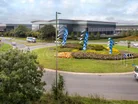Prologis: The Importance of a Nature-First Approach

Creating spaces where nature can thrive hand-in-hand with businesses is quickly rising up the agenda for the UK’s leading investors, owners and developers of logistics property. Truly dialling up master planning and having a holistic view of how strategically located parks, means companies can deliver ‘nature first’ developments.
Protecting the natural environment is now a major consideration in all development projects. The mandatory 10% Biodiversity Net Gain (BNG) requirement now ensures that developers, at the master planning stage, must consider the loss of natural habitats.
Global leader of logistics real estate Prologis focuses on high-barrier, high-growth markets and owners or has investments in over a billion square feet of property in 19 countries. As Head of Planning for Prologis UK, Caroline Musker heads up project delivery across the country and has been with the company since 2022. She sat down with Construction Digital to share her expert insight on nature-first construction.
How can environmentalism be considered at the planning stage of construction?
Consideration needs to be given to how a scheme can be designed to enhance and deliver a diverse eco environment and support nature. This is a challenge faced by all developers, and particularly the logistics sector, given the scale of developments.
Leading owners, investors and developers of logistics property have been grappling with this issue for many years and well in advance of the BNG legislation coming into force. Committed to maximising environmental improvements with its consultants and partners, one design factor is the introduction of ‘nature corridors’ - making sure that all the verges, hedges and treelines at newly developed logistics parks connect to the surrounding countryside. This is a simple but effective measure that supports wildlife, enhances habitat biodiversity and additionally meets recently implemented BNG targets.
Why are partnerships essential to successful sustainability?
Partnerships are crucial to achieving nature first developments - by engaging with external stakeholders such as Local Planning Authorities (LPA) and wildlife trusts, companies can commit to designated land banks within the same jurisdiction as the development to further promote the protection and cultivation of green spaces. There is a real benefit for everyone if an LPA can lead by example, working with communities, landowners and other partners to forward plan for nature recovery. This is particularly true in dense urban areas, where leading developers are delivering positive approaches with local authorities and other consultees to achieve BNG positive benefits.
Why do developers need to shift focus and perception to prioritise sustainability?
Considering the entire lifecycle of a scheme ahead of development is essential to delivering a ‘nature first’ approach. Nature can generate many positive wellbeing outcomes, supporting mental health as well as keeping us psychologically and physically healthy. Not only are long-term investors, owners and developers recognising their responsibility for giving back environmentally, but they are also now considering how to best combine commercially functional developments that provide spaces for the wider community.
With perceptions of working in the logistics sector still requiring a change of focus, it is important that developers and occupiers consider how their presence in communities can help to benefit those outside of their work surroundings and consider how they can best contribute to the local ecosystem.
How does nature-first design benefit the community around it, as well as the wider global community?
Not only can nature-first design help to restore the balance within local communities, green, open spaces are becoming increasingly important to potential employees. To solve this, innovative design is required to deliver outdoor environments that can keep the workforce happy and healthy. This, in turn, can help to boost productivity and in the long-term help to reduce staff sickness and absences. Whether by protecting already existing open spaces, or (particularly in built-up areas) creating them through the introduction of areas such as roof terraces, developers play a major role in boosting the long-term benefits for the employees of their customers.
Introducing pockets of greenery and creating open spaces that are accessible by members of the public for walking, cycling and sports activities which can be enclosed with hedgerows and treelines provides the environmental benefit of achieving BNG targets. Focusing on a landscape-led approach can be challenging, but the rewards of considering how parks can best be integrated into schemes are bountiful.
Creating functional parks that help customers, communities and natural environments thrive together is at the very core of leading developer’s activities. Not only can providing environmental benefits help to keep businesses competitive and achieve legislative goals, but nature-first and landscape-led design can help to boost employee morale, productivity and overall well-being. By carefully considering how to best deliver a nature-first design, developers can directly impact the societies in which they operate and help to define what “good” looks like.
******
Make sure you check out the latest industry news and insights at Construction Digital and also sign up to our global conference series - Manufacturing LIVE 2024
******
Construction Digital is a BizClik brand
*****



